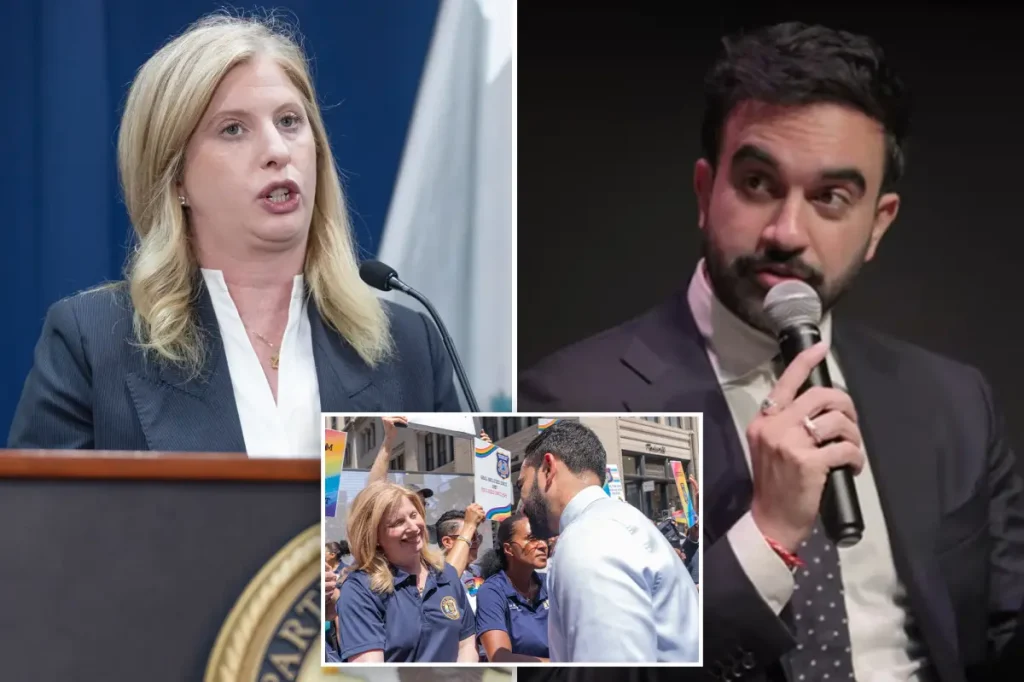Mayoral Frontrunner Mamdani Confident in Vision for NYC’s Future
In a bold assertion of leadership style, New York City mayoral frontrunner Zohran Mamdani recently addressed concerns about how he would navigate potential policy conflicts with current NYPD Commissioner Jessica Tisch. Speaking on the Hell Gate podcast, the 34-year-old Democratic Socialist confidently stated that if elected, “everyone will follow” his lead, including top city officials like Tisch. This declaration comes amid questions about whether Tisch, who has historically opposed certain criminal justice reforms, would align with Mamdani’s progressive vision for the city’s future. The exchange highlighted the delicate balance any incoming mayor must strike between asserting authority and building working relationships with existing leadership structures.
When podcast host Christopher Robbins pressed Mamdani about the apparent disconnect between his reform-minded supporters and Tisch’s more traditional stance on policing, Mamdani defended his decision to potentially keep her in the role. He pointed to Tisch’s work on initiatives that align with his own proposals, particularly the formation of a Department of Public Safety – a cornerstone of his campaign platform. This response suggests Mamdani sees potential for collaboration despite ideological differences, though skepticism remains about whether such cooperation is realistic. Tisch has previously attributed crime increases to reforms passed under former Governor Andrew Cuomo, maintained support for the controversial gang database, advocated for stricter enforcement of low-level offenses, and opposed bail and judicial-discovery reforms – positions that seem at odds with Mamdani’s progressive agenda.
The conversation echoed historical tensions between mayors and police commissioners, with Robbins drawing parallels to the tumultuous relationship between former Mayor Bill de Blasio and NYPD Commissioner Bill Bratton, which ended in Bratton’s resignation after disagreements over policing approaches. When challenged on whether Tisch would reverse her positions on these contentious issues, Mamdani responded with characteristic confidence: “I think everyone will follow my lead. I’ll be the mayor.” This statement reflects not just personal assurance but a particular theory of governance – that mayoral authority can effectively reshape department priorities regardless of prior positions held by commissioners. The exchange highlighted the fundamental question of how executive power translates to departmental change in city government.
Despite his certainty about Tisch’s willingness to adapt to his vision, Mamdani acknowledged in a subsequent CNN interview that he had not directly discussed continuation of her role under his potential administration. The candidate revealed he hadn’t had a private conversation with Tisch since July, a timeframe that raises questions about the foundation for his confidence in their potential working relationship. This admission adds complexity to Mamdani’s earlier assertions about leadership alignment, suggesting that his confidence may be based more on the theoretical power of the mayoral office than on established personal rapport or explicit agreements with Tisch. Meanwhile, the commissioner has maintained silence on the mayoral race, neither confirming nor denying interest in serving under a Mamdani administration.
The significance of this leadership dynamic extends beyond personality politics to the feasibility of Mamdani’s signature policy initiative – the creation of a Department of Public Safety. This proposed structural change to how New York City approaches public safety would require not just the mayor’s vision but also the practical support and implementation expertise of the police commissioner. The success of such a transformative initiative would depend on genuine buy-in from Tisch or whoever might lead the NYPD during Mamdani’s potential tenure. The candidate’s assertion that his leadership would naturally command followership faces its most significant test in this specific policy arena, where institutional knowledge and operational expertise meet political will.
The exchange illuminates broader questions about governance in America’s largest city, particularly how incoming administrations with reform agendas navigate existing power structures and institutional resistance. Mamdani’s confidence reflects a progressive belief that electoral mandates can overcome bureaucratic inertia, while skepticism from podcast hosts and political observers stems from historical examples of reform efforts diluted by departmental independence or resistance. As the mayoral race continues, New Yorkers are essentially being asked to evaluate not just competing policy visions but different theories of how change happens in complex urban governance systems. Mamdani’s approach suggests that mayoral authority alone can redirect departmental priorities, while critics question whether meaningful reform requires more collaborative groundwork and explicit alignment with key officials like the police commissioner.


